The U.S. State of Connecticut currently has nine statistical areas that have been delineated by the Office of Management and Budget (OMB). On July 21, 2023, the OMB delineated two combined statistical areas, five metropolitan statistical areas, and two micropolitan statistical areas in Connecticut. [1] As of 2023, the largest of these in the state is the New Haven-Hartford-Waterbury, CT CSA, encompassing the entire state outside of the Bridgeport-Stamford-Danbury, CT MSA in the southwest.
The Office of Management and Budget (OMB) has designated more than 1,000 statistical areas for the United States and Puerto Rico. [2] These statistical areas are important geographic delineations of population clusters used by the OMB, the United States Census Bureau, planning organizations, and federal, state, and local government entities.
The OMB defines a core-based statistical area (commonly referred to as a CBSA) as the county or counties (or county-equivalents) surrounding at least one densely-settled core of at least 10,000 population, [2] "plus adjacent counties having a high degree of social and economic integration with the core as measured through commuting ties with the counties containing the core". [2] The OMB further divides core-based statistical areas based on population into metropolitan statistical areas (MSAs) for those with at least 50,000 and micropolitan statistical areas (μSAs) for those with 10,000 to 49,999 people. [2]
The OMB defines a combined statistical area (CSA) as two or more adjacent core-based statistical areas where the employment interchange rate (% commuting from A to B plus % commuting from B to A) is at least 15%. [2] The primary statistical areas (PSAs) include all combined statistical areas and any core-based statistical area that is not a constituent of a combined statistical area.
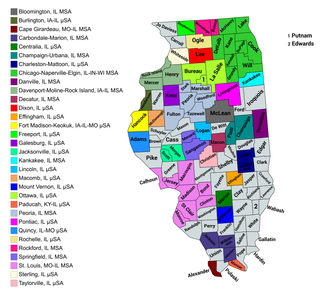
The U.S. State of Illinois currently has 43 statistical areas that have been delineated by the Office of Management and Budget (OMB). On March 6, 2020, the OMB delineated 11 combined statistical areas, 13 metropolitan statistical areas, and 19 micropolitan statistical areas in Illinois.
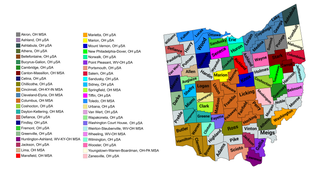
The U.S. State of Ohio currently has 55 statistical areas that have been delineated by the Office of Management and Budget (OMB). On July 21, 2023, the OMB delineated 11 combined statistical areas, 15 metropolitan statistical areas, and 29 micropolitan statistical areas in Ohio.
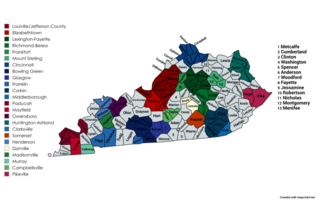
The United States Commonwealth of Kentucky currently has 32 statistical areas that have been delineated by the Office of Management and Budget (OMB). On March 6, 2020, the OMB delineated 8 combined statistical areas, 9 metropolitan statistical areas, and 15 micropolitan statistical areas in Kentucky.
The U.S. State of California currently has 42 statistical areas that have been delineated by the federal Office of Management and Budget (OMB).
The U.S. State of Alabama currently has 34 statistical areas that have been delineated by the Office of Management and Budget (OMB).
The U.S. State of Arkansas currently has 25 statistical areas that have been delineated by the Office of Management and Budget (OMB). On July 21, 2023, the OMB delineated four combined statistical areas, seven metropolitan statistical areas, and 14 micropolitan statistical areas in Arkansas. As of 2023, the most populous statistical area in the state is Little Rock-North Little Rock, AR CSA, comprising the metro area of its capital and largest city, Little Rock.

The U.S. State of Delaware currently has four statistical areas that have been delineated by the Office of Management and Budget (OMB). On July 21, 2023, the OMB delineated one combined statistical area, two metropolitan statistical areas, and one micropolitan statistical area in Delaware.

The U.S. State of Georgia currently has 46 statistical areas that have been delineated by the Office of Management and Budget (OMB). On July 21, 2023, the OMB delineated 4 combined statistical areas, 14 Georgia-based metropolitan statistical areas, and 24 micropolitan statistical areas within Georgia.

The U.S. State of Idaho currently has 22 statistical areas that have been delineated by the Office of Management and Budget (OMB). On July 21, 2023, the OMB delineated five combined statistical areas, seven metropolitan statistical areas, and ten micropolitan statistical areas in Idaho.

The U.S. State of Iowa currently has 30 statistical areas that have been delineated by the Office of Management and Budget (OMB). On March 6, 2020, the OMB delineated six combined statistical areas, nine metropolitan statistical areas, and 15 micropolitan statistical areas in Iowa.

The U.S. State of West Virginia currently has 20 statistical areas that have been delineated by the Office of Management and Budget (OMB). On July 21, 2023, the OMB delineated five combined statistical areas, 10 metropolitan statistical areas, and five micropolitan statistical areas in West Virginia.

The United States Commonwealth of Massachusetts currently has eight statistical areas that have been delineated by the Office of Management and Budget (OMB). On July 21, 2023, the OMB delineated two combined statistical area, seven metropolitan statistical areas, and three micropolitan statistical area in Massachusetts.
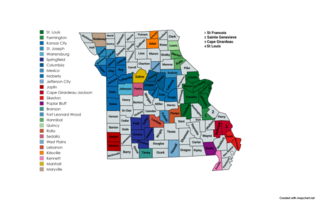
The U.S. State of Missouri currently has 31 statistical areas that have been delineated by the Office of Management and Budget (OMB). On March 6, 2020, the OMB delineated six combined statistical areas, seven metropolitan statistical areas, and 18 micropolitan statistical areas in Missouri.

The U.S. State of Louisiana currently has 25 statistical areas that have been delineated by the Office of Management and Budget (OMB). On July 21, 2023, the OMB delineated six combined statistical areas, ten metropolitan statistical areas, and nine micropolitan statistical areas in Louisiana.

The U.S. State of Nebraska currently has 16 statistical areas that have been delineated by the Office of Management and Budget (OMB). On July 21, 2023, the OMB delineated three combined statistical areas, four metropolitan statistical areas, and nine micropolitan statistical areas in Nebraska.
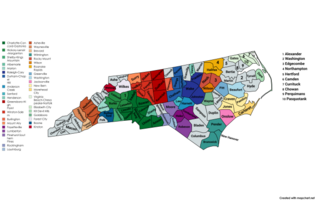
The U.S. State of North Carolina currently has 44 statistical areas that have been delineated by the Office of Management and Budget (OMB). On July 21, 2023, the OMB delineated 7 combined statistical areas, 16 metropolitan statistical areas, and 21 micropolitan statistical areas in North Carolina.

The U.S. State of North Dakota currently has nine statistical areas that have been delineated by the Office of Management and Budget (OMB). On July 21, 2023, the OMB delineated one combined statistical area, four metropolitan statistical areas, and four micropolitan statistical areas in North Dakota.

The U.S. State of Oregon currently has 24 statistical areas that have been delineated by the Office of Management and Budget (OMB). On March 6, 2020, the OMB delineated four combined statistical areas, eight metropolitan statistical areas, and 12 micropolitan statistical areas in Oregon.
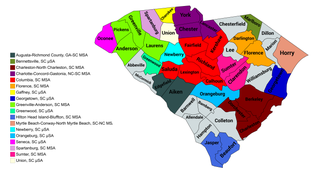
The U.S. State of South Carolina currently has 20 statistical areas that have been delineated by the Office of Management and Budget (OMB). On July 21, 2023, the OMB delineated four combined statistical areas, ten metropolitan statistical areas, and six micropolitan statistical areas in South Carolina.

The U.S. State of South Dakota currently has 14 statistical areas that have been delineated by the Office of Management and Budget (OMB). On July 21, 2023, the OMB delineated two combined statistical areas, three metropolitan statistical areas, and nine micropolitan statistical areas in South Dakota.
{{cite web}}: CS1 maint: multiple names: authors list (link)